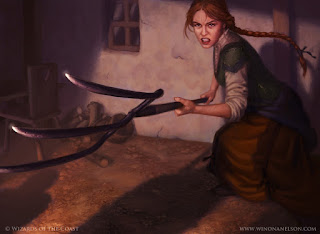This class gives the player options to build, over time, the character they want.
Hit Dice: d8
Saves: As a first level fighter. These do not improve with level; they improve with the following table.
Bonus to Hit: +1 at first level, and every level after.
Pick or roll twice from the following list. Do this at first level and every level after.
- Weather Resistance:Bonus of +1 to any save against extreme temperature or inclement weather.
- Primal Attraction: Use both Charisma and Strength modifiers for Morale and Reaction rolls.
- Defensive Stance: +1 to Armor Class, -2 to hit. Re-rolling this gives another +1/-2
- No need for armor: You have a +1 to AC and a +1 to damage in melee when you are not wearing armor, other than a helmet and/or shield. Re-rolling this grants an additional +1/+1.
- Favored Enemy: Choose an animal, monster, or sentient species. You get a +1 to hit and +1 to damage against that specific type of creature, every time this is rolled. You are also -2 on Reaction rolls with creatures of that type every time this is rolled. You can pick anything from mosquitoes to bears to dragons to humans.
- Two-Weapon fighting: You can hit with weapons in both hands. Your off hand has a -2 to hit, with no Strength bonus applicable. Re-rolling this gives a +1 to hit with the off hand.
- You have an extra attack/action per round.
- Fists of Steel: Your punches and kicks inflict +1 damage
- Increase Hit Die by one type. In other words, your d8 is now a d10. Hit points are not re-rolled.
- Intimidate: +1 to Charisma checks to instill fear against others. Intimidated opponents will cower or flee.
- Attribute Bonus: +1 to any attribute, up to species maximum.
- Save Bonus: +1 to all saves.
- Bonus of +1 to a skill. So instead of 1 in 6, you have a 2 in 6.
- Taunt: +1 to Charisma checks to taunt an opponent. Taunted opponents will attack against their own better judgement. Taunting counts as a non-attack action.
- Ranged Bonus: Pick a specific ranged weapon type (short bow, heavy crossbow, sling, etc). You can attack twice as fast with that weapon. Re-rolling means 3x as fast.
- Use two-handed weapon one handed. If re-rolled, you can wield a two-handed weapon in your off hand, as well.
- Mounted bonus: You have a +1 bonus to damage with melee weapons while mounted, and can ride without a saddle or gear with no penalty. +1 damage whenever this is re-rolled.
- Berserker Rage: When angry, you can enter into a trance-like state of fury. This grants a +2 to hit and damage, but a -4 to AC. The trance lasts for your Constitution in rounds, or until every living thing in sight is dead. Re-rolling this grants a +4 to hit and damage, but a -8 to AC.
- Offensive Stance: +1 to hit, -2 AC. Re-rolling this gives another +1/-2
- Animal Domination: With a Reaction roll you can befriend a wild animal who will now act as a retainer. The animal can not have been attacked by you or your allies in the past. Asking the animal to risk harm to itself requires another reaction roll. Failure means it will run away. Only one animal can be dominated at a time. Re-rolling this means an additional animal can be dominated.



















